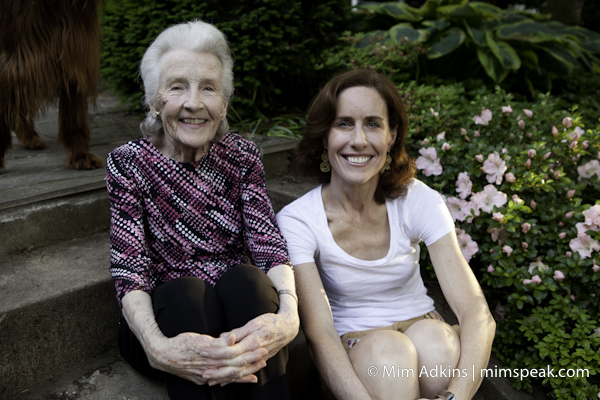

The hardest part is backing out of the driveway. You'd think, after all these years, that I would have learned to turn the car around the night before, but I think even if I did, I'd still look back. It used to be the two of them waving, each year Dad a little thinner and more wobbly. And now she just stands there alone. All 95 pounds of her with the big house looming above. Before we've honked the horn to drive away, I ache as I feel her counting the days till the next set of grandchildren will arrive to fill the place back up with noise, frog hunts, bug captures, badminton tournaments and fresh pies.
The house was built by Captain David Wilson in 1780 when he returned triumphant from the Revolutionary war. It was a grand house for the time, a majestic colonial with an enormous center chimney that heated every room in the house in the early days. My parents bought it in 1978; it had been my mother's dream house for years, but she was sure she couldn't afford it. When we stumbled back upon it, it had fallen into terrible disrepair. We were all teens then, so she decided we'd all team up and fix up the place for the summer, which we did. Nothing in the house works quite right now -- the stove tilts and makes lopsided cakes, the floors all bend at strange angles, the windows stick and remove your cuticles when you finally get them moving. It smells like mildew and makes the kids sneeze endlessly, but it's still their favorite place in the world.
The New England vacation ethic is hard to understand if you aren't raised with it. For me it just isn't a vacation if you haven't hung a load of laundry on the line, cleared a bunch of brush, swum in water that's uncomfortably cold, drawn blood picking fresh berries or received a cluster of bug bites. I mean, who wants to vacation someplace where the rope swing has already been hung? What fun is that?
In my mind, caring for the house is completely intertwined in caring for my mother -- her spectacular gardens, the countless rooms where she's lovingly hung wallpaper year after year, the homemade curtains and the chairs re-upholstered in the evenings when someone else is reading aloud, the sewing box which came directly from my grandmother's house and still contains her button and thread collection from the 1930's, and my collection of LPs from the 70's which play nonstop on the record player in the corner. The house encapsulates our family history in its 3000 square feet, and I want her to be able to live there on her own terms for as long as possible. And because, in my mind, the house is my mother, I want it to look perfect. I want to be a perfect caregiver to them both; if the house is showing wear and tear, then my mother is, too -- and that means I'm not doing a good enough job.
Jane Gross writes tenderly about navigating caregiving in her memoir, A Bittersweet Season: Caring for Our Aging Parents and Ourselves. She emphasizes the importance of recognizing that there's no such thing as a perfect caregiver. We are humans, we are flawed, and appreciating our imperfections is an essential element of finding happiness, and being compassionate in a caregiving role.
Why do we do we busy, mid-life women take on caregiving in the same way we take on a shopping list? -- "yet another get-it-done project", as Karen Stabiner writes in the New York Times' wonderful blog, The New Old Age. I beat myself up for the things I don't get done on a visit -- the computer tutorial that gets truncated by a child with a skinned knee, the confusing notice from the phone company that lies on the counter unresolved, the sticky cabinet that remains stuck as I pull out of the driveway -- and I feel guilty for the times I nag, and the impatience I feel when the solution to a problem that's not mine seems so clear to me, but much more nuanced to her. I am learning, slowly, that being a compatriot to my mother as she ages alone isn't a task; it's an evolving process where we're both feeling our way, a dynamic human relationship, built over years and with its history and quirks, reflective of the love we feel for each other, the way she raised me, and the particulars of our family culture, all of which -- good or bad -- define who I am in more ways than I can count.
This year was the first year that I appreciated the flaws of the house. I saw them as markers of history, artifacts that educate my children about the way things used to be. The cracks in the ceiling tell a hundred stories and my kids ask whether they were there when I was their age, and what I was thinking about 30 years ago when I lay awake looking up at them. Like the wrinkles on my mother's elbows (and mine, let's be honest), it reminds us of the passage of time, the care that we give to the things and people who love and define us, and the importance of seeing imperfection as a weigh station on the journey to knowledge and fulfillment.
So the pain of driving away this year wasn't from a frustration about all the tasks that I didn't get done, but a sadness that it all seems to be going by so fast and that I'm struggling to drink it all in, commit it to memory, and cherish the moments we have together.
It's not a perfect ending, but I think it's progress.
